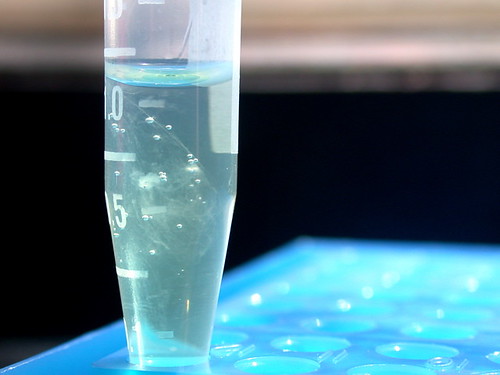 |
| Photo © Greenpeace / Christian Lehsten |
McClones
July 2011
Cloning animals isn't strictly a GM-food issue. However, it does involve removing DNA from its native environment and putting into a new one, with all the same, inevitable, disruption of genomic coherence and compromised health (see Nuclear Transplant (Cloning) below). There's also no doubt that the major incentive for cloning animals is that the procedure enables genetic transformation.
US consumers demand GM labelling
July 2011
America is very fond of selling itself around the world: it sells its model agriculture plus chemicals plus GMOs; it sells its model business plus globalisation plus 'voluntary' self-regulation; and especially, it sells its democracy.
Paradoxically, regarding the 'home' agriculture and 'home' market, it seems that US consumers are going in one direction while its administration, hand-in-hand with industry, is going in another.
This sounds a strange sort of a democracy. And, there are signs it's about to crack.
 |
| Photo by brdavid on Flickr |
Paradoxically, regarding the 'home' agriculture and 'home' market, it seems that US consumers are going in one direction while its administration, hand-in-hand with industry, is going in another.
This sounds a strange sort of a democracy. And, there are signs it's about to crack.
GM wheat in the UK
July 2011
Genetically transformed wheat of any kind has been decisively rejected throughout the world, including America.
Strangely however, the message never seems to have reached biotech scientists, nor their funders. The development of GM wheat has continued behind lab doors regardless of public or commercial desires. At least two strains of a novel wheat are now ready for field testing in the UK.
The Department of the Environment, Food and Rural Affairs (DEFRA) has received an application from Rothamsted Research to carry out a two-year field trial of aphid-resistant GM wheat, to run during 2012 and 2013.
 |
| Non-GM wheat kernels Photo by David Shand on Flickr |
Strangely however, the message never seems to have reached biotech scientists, nor their funders. The development of GM wheat has continued behind lab doors regardless of public or commercial desires. At least two strains of a novel wheat are now ready for field testing in the UK.
The Department of the Environment, Food and Rural Affairs (DEFRA) has received an application from Rothamsted Research to carry out a two-year field trial of aphid-resistant GM wheat, to run during 2012 and 2013.
GM crops in Scotland?
July 2011
American rice growers will give you two practical reasons NOT to grow GM crops.
One, you might contaminate your neighbour's non-GM fields. If you're lucky all you'll have to suffer is guilt and the loss of goodwill of someone it would be better to be friends with. If you're unlucky you'll also have to pay him compensation for his loss of non-GM sales.
Two, the market doesn't want GM, even if it's legal, and the cost of finding yourself with a crop and no market is crippling. US rice growers who suddenly discovered their non-GM seed had become contaminated by a (hastily legalised) GM strain suffered losses in excess of £762 million. This figure isn't an off-the-cuff estimate. It's what the courts have, so far, ordered to be paid by out the biotech company in compensation after it failed to contain its GM rice trials. The final figure may be higher, and there are certainly many more rice growers whose business was damaged but who were unable to bring or prove their case in court.
Scotland has another important reason to avoid GM.
 |
| Photo from Flickr |
One, you might contaminate your neighbour's non-GM fields. If you're lucky all you'll have to suffer is guilt and the loss of goodwill of someone it would be better to be friends with. If you're unlucky you'll also have to pay him compensation for his loss of non-GM sales.
Two, the market doesn't want GM, even if it's legal, and the cost of finding yourself with a crop and no market is crippling. US rice growers who suddenly discovered their non-GM seed had become contaminated by a (hastily legalised) GM strain suffered losses in excess of £762 million. This figure isn't an off-the-cuff estimate. It's what the courts have, so far, ordered to be paid by out the biotech company in compensation after it failed to contain its GM rice trials. The final figure may be higher, and there are certainly many more rice growers whose business was damaged but who were unable to bring or prove their case in court.
Scotland has another important reason to avoid GM.
UK Policy on genetic modification
July 2011
The Coalition Government in Westminster has released its first policy statement on “Genetic Modification (GM)” (see Below).
Its “overriding priorities” are “the protection of human health and the environment”.
To ensure these priorities are met, the government “will only agree” to the release of GMOs (crops and others) and to the marketing of GM food and feed providing:
 |
| Photo from Flickr |
Its “overriding priorities” are “the protection of human health and the environment”.
To ensure these priorities are met, the government “will only agree” to the release of GMOs (crops and others) and to the marketing of GM food and feed providing:
- “a robust risk assessment indicates it is safe”
- full account has been taken of the scientific evidence
- clear labelling and suitable information are provided to enable consumer choice
- in the event of commercial GM crops being grown in England, economic interests of conventional and organic farming are “appropriately protected”.
Bt is toxic to plants
July 2011
A recently published paper demonstrates the breathtaking assumptions on which commercial GM crops are based.
When genetic transformation of plants was first attempted, it was soon discovered that, while all DNA has a simple four-fold chemical structure which can easily be translated by man into a specific protein, DNA is not just DNA.
 |
| Photo from Flickr |
When genetic transformation of plants was first attempted, it was soon discovered that, while all DNA has a simple four-fold chemical structure which can easily be translated by man into a specific protein, DNA is not just DNA.
Subscribe to:
Posts (Atom)